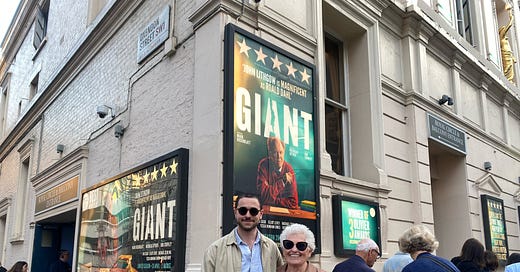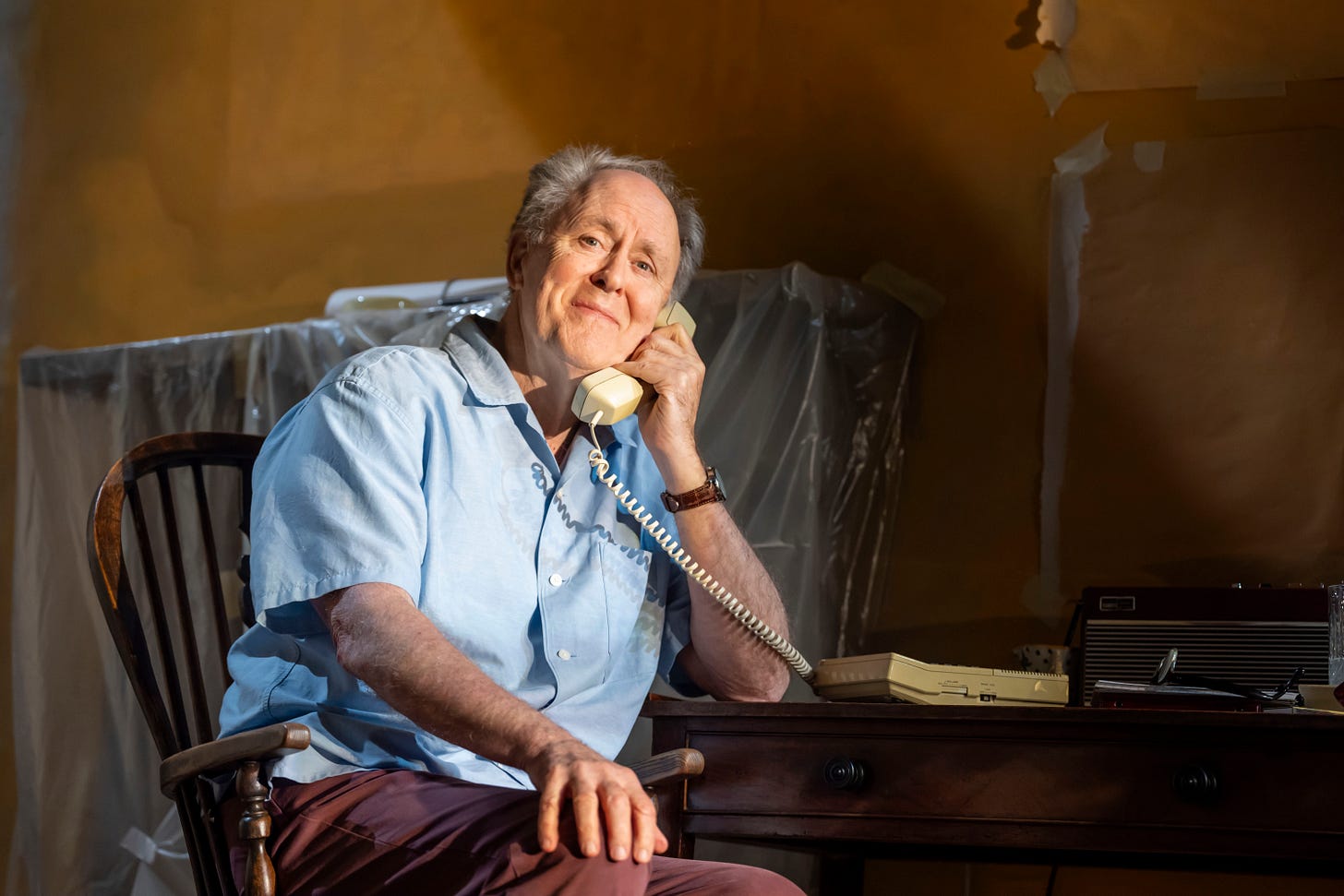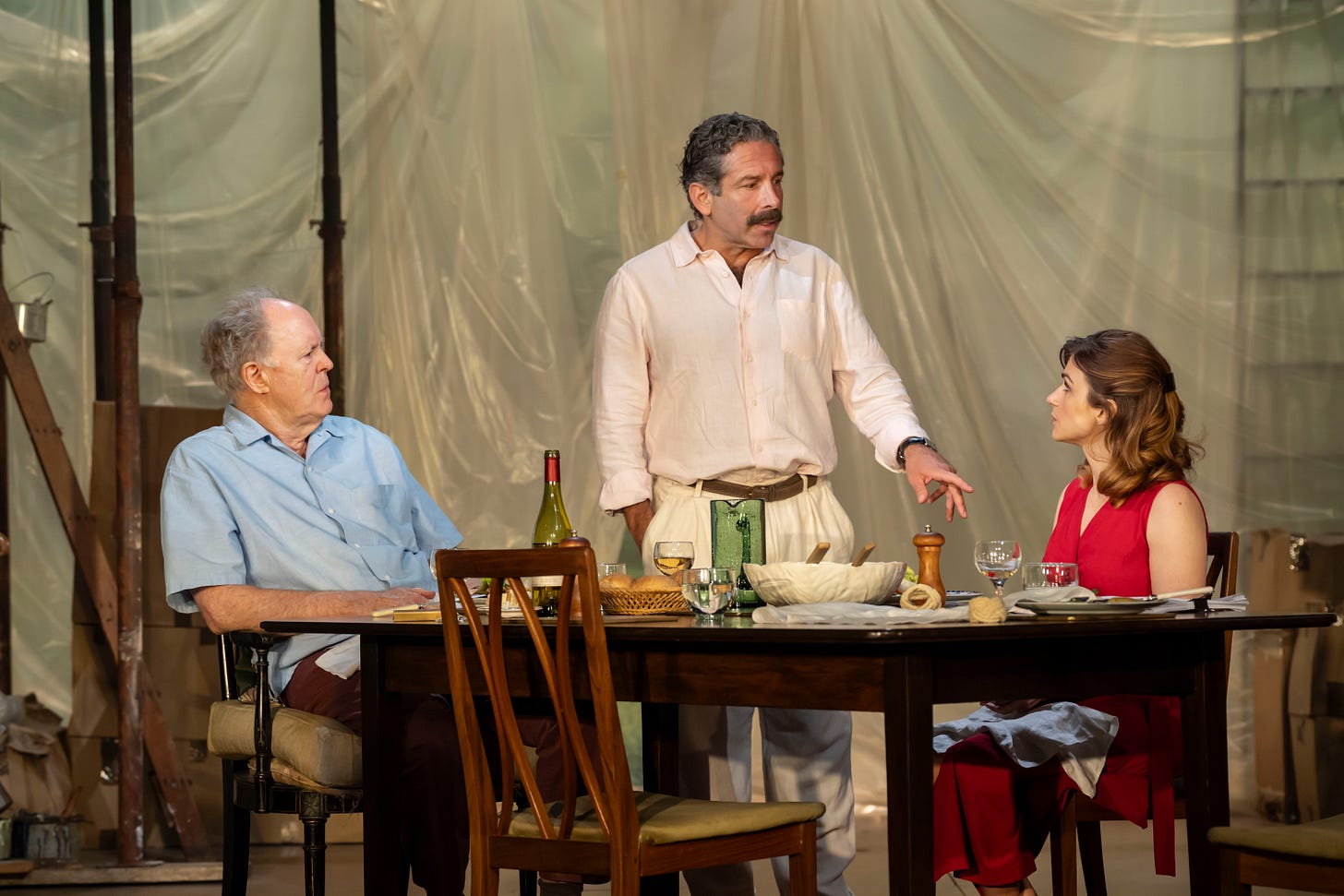Watching Giant with my Jewish Grandma
As the Roald Dahl drama transfers to the West End, Alexander Cohen and his Grandma discuss the play, antisemitism, and what it means to be a British Jew
By Alexander Cohen
I am a British Jew, London born. In Giant, I see so many of my own fractured thoughts towards Israel, towards Jewishness, towards art, and towards antisemitism all wrestling, swirling, dancing together in a triumphant night of theatrical brilliance.
How painfully true it is when critics wrote that it could not come at a more pressing time. Mark Rosenblatt’s play imagines the aftermath of Roald Dahl’s real life 1983 antisemitic book review of God Cried, an account of Israel’s devastating invasion of Lebanon. Giant was programmed at the Royal Court just two days before Hamas’s attacks on Israel on 7 October 2023. The venue, and the director Nicholas Hytner, stood by the play, which opened to hugely positive reviews last autumn, and has now transferred triumphantly to the West End, with John Lithgow reprising his Olivier-winning performance as Dahl.
But I can’t help but feel that some commentators and critics have been distracted by the Israel/Palestine aspect. The conflict is front and centre of the human drama, but it is a stepping stone to the play’s wider ideas; getting stuck in the mud pondering the parallels between Israel’s invasion of Lebanon in 1982 and the current situation in Gaza, and whether the play justly balances geo-political perspectives, does the play a disservice. Because Giant is fundamentally about two things: one, what lies underneath that debate, the psychological currents that drive us to love and care for each other, but which can also tear us apart through hate and bigotry. Two, the protean nature of British Jewish communities.
And to unpick the latter, we need serious expertise. Time to call in the BIG GUNS. Venerated with critical praise, festooned with awards, and adored by audiences, now Giant faces its toughest challenge: my Yiddishe Mame my Jewish Grandma, Hazel Cohen.
Straight outta Stoke Newington, they don’t make Jews like my Grandma anymore. On the Royal Court’s Playwright Podcast, the first question posed to writers is about their earliest memory of going to the theatre. For her, a woman in her eighties, it’s The Merchant of Venice performed at one of the many Yiddish language theatres then in London’s East End.
It’s difficult to imagine what Stoke Newington was like. If you trundle up the Overground there today and squint you can just about picture it. Coal coated Victorian pavements, market stalls bustling, voices fractured by rhythms of the old world, the earthiness of German undercut with garbled Hebrew. Blot out the bakeries, the yummy mummies, the invisible hand of gentrification, and you can sense echoes of a lost time.
The kind of Jewish world my Grandma grew up in is utterly intangible for me, living in the capital as it is today. London’s East End had been the heart of Jewish life in Britain since the late 19th century after consecutive waves of Jewish immigration from Eastern Europe fleeing pogroms. But the Blitz, along with economic aspirations for better housing, drove many away from the East End to the leafy London suburbs where my generation grew up.
But flickers remain of the old world through language. We meet at the station. I’m slightly late so Grandma insists we must schlap to the theatre.
The catalyst for the drama in Giant is a genuine book review that Dahl wrote, in which his vehement criticism of Israeli military aggression in Beirut spilled into antisemitism. His British and American publishers, Tom Maschler (Elliot Levey, who also won an Olivier) and Jessie Stone (an excellent Aya Cash, stepping into the shoes of Olivier-nominated Romola Garai) are parachuted in to manage the PR crisis. They just so happen to be Jewish.
In the review, Dahl described Jewish people as “a race” who had “switched so rapidly from victims to barbarous murderers.” This was followed by the claim that the US was “so utterly dominated by the great Jewish financial institutions” that the Americans “dare not defy” Israel. In a later interview with the New Statesman, he declared that “there is a trait in the Jewish character that does provoke animosity... even a stinker like Hitler didn’t just pick on them for no reason.”
In October 2023 another iteration of the same conflict reignited, bringing with it tragic bloodshed – and new waves of the world’s oldest hatred for Jewish people across the world. The stats on UK antisemitism are a disturbing read, but as is the case with any statistics they mask the human cost underneath. Everyone in my immediate family has witnessed or been victim to some kind of antisemitism in the last year and a half. If I open Instagram it takes me two minutes of scrolling to find anti-Jewish racism.
Grandma and I make it to the Harold Pinter Theatre, take our seats, and peer around.
GRANDSON: How much of the audience is Jewish?
GRANDMA scans the room before pointing at Elliot Levey’s picture in the programme.
GRANDMA: Look at him he must be Jewish
GRANDSON: Well yeah…
The lights dim, and the play begins. Dahl’s racism is subtle at first. Bit by bit the mask slips – but Grandma and I could always see what was on the other side. Take, for instance, when he spikily suggests that the backlash to his review has come from circles in “Hendon or Stamford Hill.” We giggle because we know exactly what is going on.
“Stone – is that a Jewish name?” jabs Dahl. The way John Lithgow over-relishes the ‘Jew’ in Jewish is both funny and grimace inducing. The rest of the audience are mostly stony-faced silent, the well-intentioned silence of the slightly self-conscious hegemony. But then Dahl unravels, and the brutality of his racism can fester in the cold light to a cacophony of audible gasps.
The next day, we debrief over a phone call.
GRANDMA: We know exactly what is going on. That’s why it’s funny. It’s obvious to us from the beginning.
Keep reading with a 7-day free trial
Subscribe to Exeunt to keep reading this post and get 7 days of free access to the full post archives.








